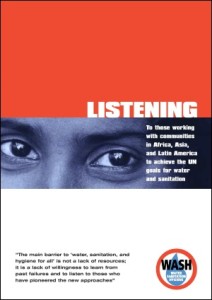In 2001, the Water Supply and Sanitation Collaborative Council (WSSCC) asked P&LA to advise on making sure that the issue of clean water and safe sanitation was not ignored at the World Conference on Sustainable Development (the Earth Summit, Johannesburg, August-September, 2002).
The P&LA contribution focused on:
- Creating the WASH acronym – for ‘water, sanitation and hygiene – and designing the WASH logo as the campaign brand
- Distilling WASH into a limited number of key messages
- Enlisting the support of President Nelson Mandela, UN Secretary-General Kofi Annan, and Archbishop Desmond Tutu
- Presenting the key messages and WASH logo to all delegates and media by both conventional methods and by the placing of WASH campaign materials in every toilet and washroom used by conference attendees – in hotels, restaurants, conference centres and committee rooms.
The result was the ‘It’s the Big Issue’ campaign which confronted delegates and media from the moment they arrived in Johannesburg until their departure ten days later.
‘It’s the Big Issue’ flyers and adverts greeted conference arrivals at the airport; street light ads and banners lined the route to the city; leaflets, posters, drinks mats, and mirror stickers were found by delegates in bathrooms and toilets of hotels, restaurants, and all conference venues, often distributed by volunteers wearing WASH T-shirts and caps. The two-minute ‘It’s the Big Issue’ publication (see below) was placed before every delegate and media representative while a walk-through WASH exhibition was erected at the two main conference venues.
View pdf of the ‘It’s the Big Issue’ publication.
View mobile exhibit developed for the Earth Summit
View other campaign materials used in Johannesburg
The Listening Report
As a follow up to the WASH campaign, P&LA proposed to the WSSCC the idea of a LISTENING report.
Its premise was that “decades of effort and billions of dollars expended on water and sanitation have so far failed to bring their expected benefits to the developing world” and that “The main barrier to is not a lack of resources but a lack of willingness to learn from past failures and to listen to those who have pioneered the new approaches”
Accordingly, the LISTENING report interviewed 38 individuals from Asia, Africa and Latin America – community and NGO leaders, engineers, sociologists, doctors, government ministers, and local government officials – all with many years of experience and commitment to the cause of ‘water, sanitation and hygiene for all.’
The introduction drew together some of the fundamental lessons learnt and gave voice to some of the most strongly felt concerns of practical pioneers in water, sanitation and hygiene in some of the world’s poorest communities.